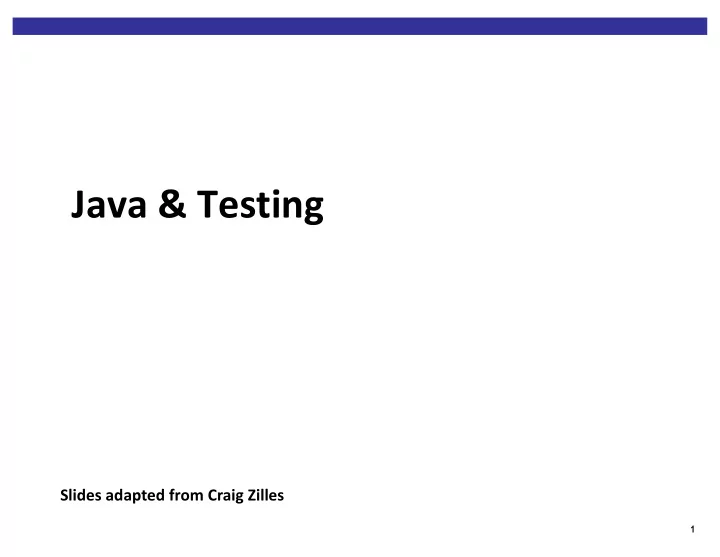

Java & Testing Slides adapted from Craig Zilles 1
Things to have been doing ¢ join UIUC CS 126 on piazza.com ¢ get an iClicker registered at http://iclicker.com ¢ get a GitHub account ¢ install IntelliJ on to your laptop (students can get the Ultimate version for free) ¢ clone an Introduction repo and edit it to put in your netid: § https://classroom.github.com/a/9B0CTBDF ¢ review course policies: § https://courses.engr.illinois.edu/cs126 ¢ Code review survey § https://doodle.com/poll/wtaikzrxtzyai9xs 2
Why Test? ¢ Improve quality - find faults ¢ Measure quality § Prove there are no faults? (Is it possible?) § Determine if software is ready to be released § Determine what to work on § See if you made a mistake ¢ Learn the software 3
Testing vs. Debugging ¢ Testing is detecting errors ¢ Debugging is a means of diagnosing and correcting the root causes of errors that have already been detected. 4
Types of testing ¢ Unit Testing ¢ Component Testing ¢ Integration Testing ¢ Regression Testing ¢ System Testing 5
Types of testing ¢ Unit Testing The execution of a complete class, routine, or small program that has been written by a single programmer or team of programmers, which is tested in isolation from the more complete system. ¢ Component Testing ¢ Integration Testing ¢ Regression Testing ¢ System Testing 6
Two Approaches to Testing ¢ Black box testing: ¢ White box testing: 7
Two Approaches to Testing ¢ Black box testing: a.k.a. Behavioral Testing § is a software testing method in which the internal structure/design/implementation of the item being tested is not known to the tester. ¢ White box testing: a.k.a. Structural Testing § exploits knowledge of the internal structure/design/implementation of the item being tested, generally to ensure good code coverage and test potential corner cases in the implementation. 8
What kind of tests? ¢ Manual § Good for exploratory § Good for testing GUI § Manual regression testing is BORING ¢ Automatic § Test is a program § Test is created by a tool that records user actions § The only way to make testing efficient as well as effective is to automate as much as possible 9
Junit ¢ Open source Java testing framework for automated testing ¢ Widely used in industry ¢ Features: § Assertions for testing expected results § Test features for sharing common test data § Test suites for easily organizing and running tests § Graphical and textual test runners ¢ Primarily for unit and integration testing, not system testing 10
Definitions ¢ Which kind of testing is “specification testing” A) Black box testing B) White box testing 11
Black box testing exercise ¢ A program needs to be developed so that given an integer value § it outputs 0 when the integer value is 0 § it outputs 1 when the integer value > 0 § It outputs -1 when the integer value < 0 ¢ What would be your black box tests? (How many do you need?) 12
Bag of Testing Tricks ¢ Equivalence Partitioning: If two test cases flush out exactly the same errors, you need only one of them. How many different groups of inputs are there? Test each of them. ¢ Error Guessing: guesses about where the program might have errors, based on your experience/intuition ¢ Boundary Analysis: write test cases that exercise the boundary conditions, looking for ‘off-by-one’ errors. ¢ Classes of Good Data: Nominal cases (middle-of-the-road, expected values), minimum/maximum normal configuration, compatibility with old data ¢ Classes of Bad Data: Too little data (or no data), too much data, the wrong kind of data (invalid data), the wrong size of data, uninitialized data 13
Test First or Test Last? (Guess) A) Test First (write tests before you write code) B) Test Last (write tests after you write code) 14
Test First ¢ Detect defects earlier (cheaper) ¢ Forces understanding of the requirements before you start coding ¢ Identifies problems with the requirements earlier ¢ No more effort to test first ¢ A tenet of eXtreme Programming (XP) § A design technique, not a testing technique § Doesn’t find bugs, but eliminates them § Doesn’t measure quality, but improves it 15
Recommend
More recommend
Stay informed with curated content and fresh updates.